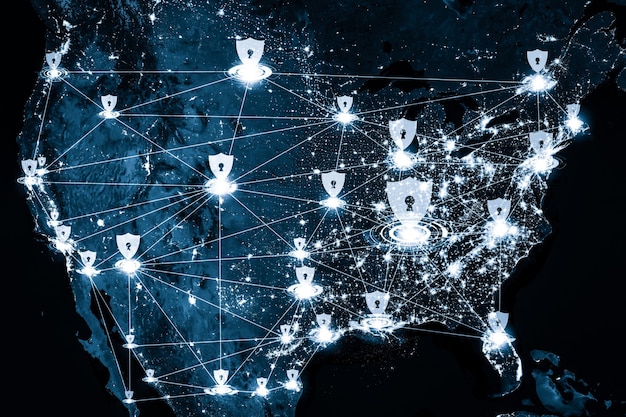Data Privacy Regulations: A US Consumer’s Guide

New regulations on data privacy aim to give US consumers more control over their personal data, impacting how companies collect, use, and share information, and offering clarity and enforcement in the digital age.
Navigating the evolving landscape of data privacy can be challenging. New regulations on data privacy are designed to protect US consumers, and understanding them is crucial for every individual in the digital age.
The Growing Need for Data Privacy Regulations
In an era where personal data is constantly collected and shared, the need for robust data privacy regulations has never been more critical. These regulations seek to address the power imbalance between consumers and corporations, ensuring individuals have more control over their information.
The digital landscape has transformed how we interact with businesses and services, often at the cost of our personal information. Without comprehensive regulations, consumers are vulnerable to data breaches, identity theft, and misuse of sensitive details.
Evolving Digital Landscape
The rise of data-driven technologies has led to increased collection and processing of personal data. Understanding the critical need for data privacy regulations reflects an evolving response to these challenges.
Consumer Awareness and Rights
Consumers are growing more conscious of their data privacy rights. Regulations provide a framework for transparency and accountability.
- Protecting personal information from misuse.
- Ensuring data security and preventing breaches.
- Empowering consumers with control over their data.
- Promoting fair and transparent data practices.
In conclusion, the increasing dependency of our daily lives on digital interactions necessitates the implementation of effective data privacy regulations. These protect individuals and set standards for organizational accountability in the handling of personal data.

Key Components of US Data Privacy Regulations
Data privacy regulations in the US are multifaceted, incorporating several important components. These components work together to strengthen consumers’ rights and clarify the duties of companies handling personal information.
Understanding the key aspects of these regulations is essential for both consumers and businesses. Awareness helps consumers protect themselves, while compliance aids companies in ensuring ethical and legal data practices.
Transparency and Consent
Companies must be transparent about their data collection practices, providing clear and accessible privacy policies. Consent mechanisms are critical, allowing consumers to make informed decisions about data sharing.
Data Security and Breach Notification
Regulations mandate robust data security measures to prevent breaches and unauthorized access. Prompt breach notification requirements ensure timely alerts to affected consumers, enabling mitigation steps.
- Right to access personal data held by companies.
- Right to correct inaccuracies in their data.
- Right to delete personal data under certain conditions.
- Right to opt-out of data collection and processing.
US data privacy regulations provide a robust framework to protect consumer data, mandating transparency, security, and individual rights. By understanding and utilizing these components, both consumers and businesses can create an environment of trust and accountability that supports responsible data handling.
How New Regulations Impact US Consumers
New data privacy regulations bring significant changes that directly impact US consumers. These regulations aim to empower individuals by providing greater control over their personal information and establishing clear guidelines for how businesses handle data.
The effects of these regulations span various aspects of everyday life, from online shopping to social media usage. By understanding these impacts, consumers can better protect their privacy and make informed decisions.

Enhanced Control Over Personal Data
Consumers gain more control over their data, including rights to access, correct, and delete personal information. This empowerment helps individuals manage their digital footprint and reduce the risk of misuse.
Increased Transparency from Companies
Companies are required to provide more transparent and understandable privacy policies. This transparency helps consumers make better-informed choices about the services they use and the data they share.
- Improved consumer trust in businesses.
- Reduced risk of data breaches and identity theft.
- Greater accountability for companies handling data.
- Promotion of ethical data practices within organizations.
The new data privacy regulations have far-reaching positive impacts on US consumers, fostering a more secure and transparent digital environment. Enhanced control, increased transparency, and robust enforcement mechanisms work together to protect personal information and empower individuals in the digital age.
Challenges and Opportunities for Businesses
Implementing new data privacy regulations presents both challenges and opportunities for businesses operating in the US. Compliance requires significant adjustments in data handling practices, but it also offers a chance to build stronger relationships with customers.
Businesses must navigate complex regulatory frameworks, invest in privacy-enhancing technologies, and adopt ethical data practices. Embracing these changes can drive competitive advantage and enhance brand reputation.
Navigating Regulatory Complexity
Businesses face the challenge of understanding and complying with various federal and state-level data privacy laws. The complexities necessitate robust legal and compliance strategies.
Investing in Privacy-Enhancing Technologies
Compliance requires investments in technologies that support data protection, such as encryption, anonymization, and privacy management platforms.
- Building trust with customers through ethical data practices.
- Gaining a competitive edge by demonstrating privacy leadership.
- Reducing the risk of costly data breaches and legal penalties.
- Promoting innovation in privacy-friendly technologies.
Despite the complexities, new data privacy regulations offer opportunities for businesses to enhance their operations and build trust with customers. By embracing compliance and ethical practices, organizations can thrive in an increasingly privacy-conscious market.
The Role of Federal and State Laws
Data privacy in the US is governed by a combination of federal and state laws, creating a complex regulatory landscape. Understanding the interplay between these laws is essential for both consumers and businesses.
Federal laws, such as HIPAA and COPPA, address specific sectors, while state laws, like the CCPA in California, provide broader protections. Harmonizing these regulations remains an ongoing challenge.
Federal Data Privacy Laws
Federal laws focus on specific types of data and industries. These include the Health Insurance Portability and Accountability Act (HIPAA) and the Children’s Online Privacy Protection Act (COPPA).
State Data Privacy Laws
State laws offer more comprehensive data privacy protections, with California leading the way through the California Consumer Privacy Act (CCPA) and the California Privacy Rights Act (CPRA). Other states are following suit with similar legislation.
- Promoting consistent data protection standards across the country.
- Establishing clear guidelines for businesses operating nationwide.
- Ensuring robust enforcement of data privacy rights.
- Encouraging innovation in privacy-enhancing technologies.
The combination of federal and state laws forms the basis of data privacy regulation in the US. While overlaps and inconsistencies create challenges, ongoing efforts aim to harmonize these regulations and provide stronger, more consistent protections for consumers.
Future Trends in Data Privacy
The field of data privacy is constantly evolving, driven by technological advancements and increasing consumer awareness. Keeping abreast of future trends is crucial for both consumers and businesses.
Emerging technologies like AI and blockchain are set to reshape data privacy practices. Regulatory frameworks will need to adapt to these innovations to ensure continued protection and accountability.
AI and Data Privacy
Artificial intelligence raises new concerns about data collection, processing, and bias. Future regulations will need to address these challenges to ensure fair and ethical AI practices.
Blockchain and Data Security
Blockchain technology offers potential solutions for enhancing data security and privacy through decentralized and encrypted systems. However, its implementation raises questions about scalability and governance.
- Increased use of privacy-enhancing technologies.
- Greater emphasis on data minimization and purpose limitation.
- Empowered consumers with control over their data.
- More robust enforcement of data privacy rights.
The future of data privacy will be shaped by emerging technologies and evolving consumer expectations. Staying informed and proactive is essential for navigating this dynamic landscape and promoting a secure and ethical digital environment.
| Key Point | Brief Description |
|---|---|
| 🛡️ Consumer Rights | US consumers gain rights to access, correct, and delete their personal data. |
| 🏢 Business Impact | Businesses must comply with complex regulations, investing in privacy-enhancing technologies. |
| ⚖️ Federal & State Laws | Data privacy is governed by both federal and state laws, creating a complex legal landscape. |
| 🚀 Future Trends | AI and blockchain will reshape data privacy, requiring adaptive regulatory frameworks. |
Frequently Asked Questions (FAQ)
▼
The primary goals include empowering consumers with control over their data, increasing transparency from companies, and establishing robust enforcement mechanisms to protect personal information.
▼
As a consumer, you gain the right to access your personal data held by companies, correct any inaccuracies, delete your data under certain conditions, and opt-out of data collection and processing.
▼
Businesses are required to be transparent about their data practices, obtain consent for data collection, implement robust data security measures, and provide timely breach notifications to affected consumers.
▼
Federal laws address specific types of data and industries, while state laws offer broader protections. The interplay between these laws aims to create a comprehensive data privacy framework for US consumers.
▼
Keep an eye on emerging technologies like AI and blockchain, as they will significantly impact data privacy practices. Additionally, watch for developments in regulatory frameworks adapting to these innovations.
Conclusion
Understanding new regulations on data privacy is essential for US consumers navigating the digital age. These regulations aim to empower individuals, ensure transparency from businesses, and establish a robust framework for data protection. By staying informed and proactive, both consumers and businesses can foster a more secure and ethical digital environment.





